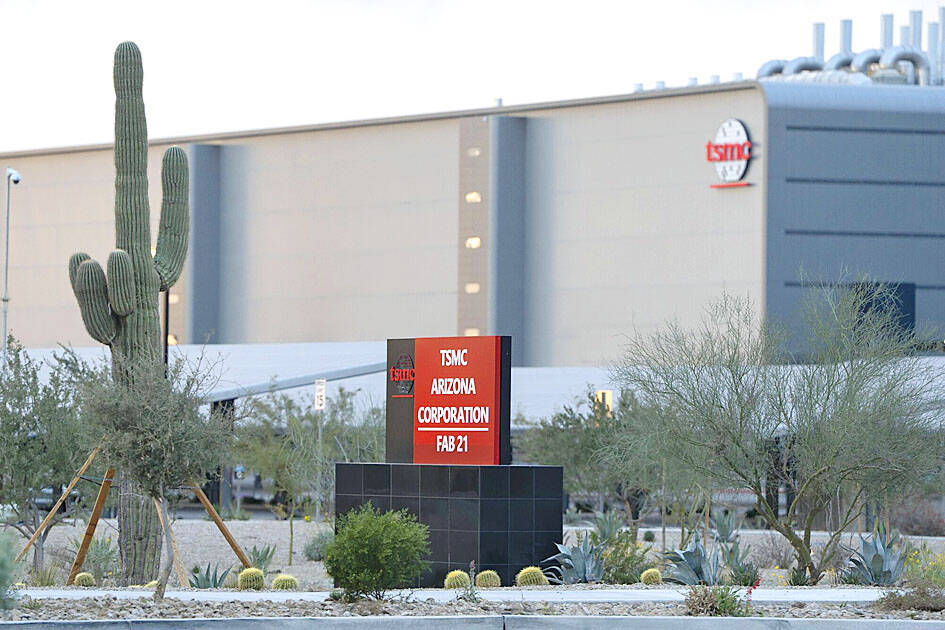Softbank Group Corp founder Masayoshi Son is seeking to team up with Taiwan Semiconductor Manufacturing Co (TSMC, 台積電) to realize what could be his biggest bet yet — a trillion-dollar industrial complex in Arizona to build artificial intelligence (AI)-powered robots.
Son envisions a version of the vast manufacturing hub of China’s Shenzhen that would bring back high-tech manufacturing to the US, according to people familiar with the billionaire’s thinking.
The park could comprise of production lines for AI-powered industrial robots, they said, asking not to be named as the plan remains private.

Photo: Bloomberg
Softbank officials are keen to have the Taiwanese maker of Nvidia Corp’s advanced AI chips play a prominent role in the project, although it is not clear what part Son sees for TSMC, which already plans to invest US$165 billion in the US and has started mass production at its first Arizona factory. Nor is it clear that TSMC would be interested.
A person familiar with the chipmaker’s thinking said that Softbank’s project has no bearing on TSMC’s plans in Arizona.
Codenamed “Project Crystal Land,” the Arizona complex represents the 67-year-old Softbank founder’s most ambitious attempt in a career that has spanned numerous bet-the-house bids, thousands-fold-returns and billions of dollars of losses. Son, who has often expressed disappointment in his own legacy, has repeatedly said he means to do everything he can to speed up AI development.
Softbank officials have spoken with federal and state government officials to discuss possible tax breaks for companies building factories or otherwise investing in the industrial park, including talks with US Secretary of Commerce Howard Lutnick, the people said.
The Japanese billionaire is also personally sounding out interest among an array of technology companies, they said. The project has been floated to executives at South Korea’s Samsung Electronics Co, they said.
Son has pulled together a list of Softbank Vision Fund portfolio companies that might take part in the Arizona manufacturing hub, the people said.
Softbank-backed start-ups working on robotics and automation technologies — such as Agile Robots SE — could set up production facilities at the industrial complex, they said.
The plans are preliminary and feasibility hinges on support from the administration of US President Donald Trump and state officials. While the cost of the project as envisioned by Son could require as much as US$1 trillion to execute, the actual scale depends on interest from big technology companies. If successful, Son has floated building multiple cutting-edge parks across the US.

South Korea’s equity benchmark yesterday crossed a new milestone just a month after surpassing the once-unthinkable 5,000 mark as surging global memory demand powers the country’s biggest chipmakers. The KOSPI advanced as much as 2.6 percent to a record 6,123, with Samsung Electronics Co and SK Hynix Inc each gaining more than 2 percent. With the benchmark now up 45 percent this year, South Korea’s stock market capitalization has also moved past France’s, following last month’s overtaking of Germany’s. Long overlooked by foreign funds, despite being undervalued, South Korean stocks have now emerged as clear winners in the global market. The so-called “artificial intelligence

NEW IDENTITY: Known for its software, India has expanded into hardware, with its semiconductor industry growing from US$38bn in 2023 to US$45bn to US$50bn India on Saturday inaugurated its first semiconductor assembly and test facility, a milestone in the government’s push to reduce dependence on foreign chipmakers and stake a claim in a sector dominated by China. Indian Prime Minister Narendra Modi opened US firm Micron Technology Inc’s semiconductor assembly, test and packaging unit in his home state of Gujarat, hailing the “dawn of a new era” for India’s technology ambitions. “When young Indians look back in the future, they will see this decade as the turning point in our tech future,” Modi told the event, which was broadcast on his YouTube channel. The plant would convert

‘SEISMIC SHIFT’: The researcher forecast there would be about 1.1 billion mobile shipments this year, down from 1.26 billion the prior year and erasing years of gains The global smartphone market is expected to contract 12.9 percent this year due to the unprecedented memorychip shortage, marking “a crisis like no other,” researcher International Data Corp (IDC) said. The new forecast, a dramatic revision down from earlier estimates, gives the latest accounting of the ongoing memory crunch that is affecting every corner of the electronics industry. The demand for advanced memory to power artificial intelligence (AI) tasks has drained global supply until well into next year and jeopardizes the business model of many smartphone makers. IDC forecast about 1.1 billion mobile shipments this year, down from 1.26 billion the prior

People stand in a Pokemon store in Tokyo on Thursday. One of the world highest-grossing franchises is celebrated its 30th anniversary yesterday.